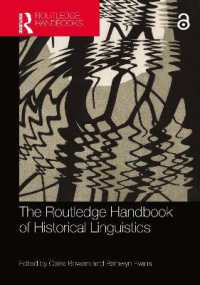- ホーム
- > 洋書
- > 英文書
- > Philosophy
Full Description
This volume presents new research on the epistemology of experts. It features original essays from leading epistemologists on this timely topic.
Modern societies benefit significantly from a certain kind of epistemic division of labor: they outsource much of their epistemic work to well-trained cognitive experts. However, due to their degree of specialization, cognitive sophistication, and highly privileged status, cognitive experts tend to become alienated from laypeople. This leads to what one may call the paradox of experts: as experts become more competent, specialized, and sophisticated, the harder it will be for laypeople to identify and trust experts. The chapters in this volume explore the epistemology of expert judgment across several core themes and crucial questions:
Analysis of Experts: What does it take to be a cognitive expert?
Epistemic Authority: How much should we concede experts over laypeople?
The Social Roles of Experts: What role do experts play in society, and what role should they play?
Challenges: What problems arise from experts' epistemic authority and societal role?
The Epistemology of Experts is an essential resource for scholars and advanced students working in epistemology, philosophy of science, political philosophy, and the sociology of knowledge.
Contents
Introduction Part 1: Analysis of Experts 1. Experts, Epistemic Authorities, and the Problem of Public Exposure 2. Becoming an Expert: Truth, Process, and Authority Part 2: Epistemic Authority 3. Preemptionism and its Reliabilistic Assumption: A Bayesian Model 4. Epistemic Authority and Expertise 5. What Justifies Believing on the Authority of an Expert? Testimonial Reductionism Versus an Epistemic Second-Personal Reason for Belief Part 3: The Social Roles of Experts 6. On Being Entitled to Expect Enlightenment by Expertise 7. Intellectual Authority and Education 8. Epistemic Anarchy and the Role of Experts 9. Expert Judgment: Overlooked Epistemic Reasons Part 4: Challenges 10. ... 11. What to Do When Experts Disagree 12. Inquiry and the Positive Epistemic Value of Diversity 13. The Infodemic, Epistemic Exclusion in Science Communication, and Distrust in Scientific Expertise 14. Distrusting Expert Testimony and Conspiracy Theories 15. Explaining Alternative Beliefs: Hypocrisy and Trustworthiness in Science






